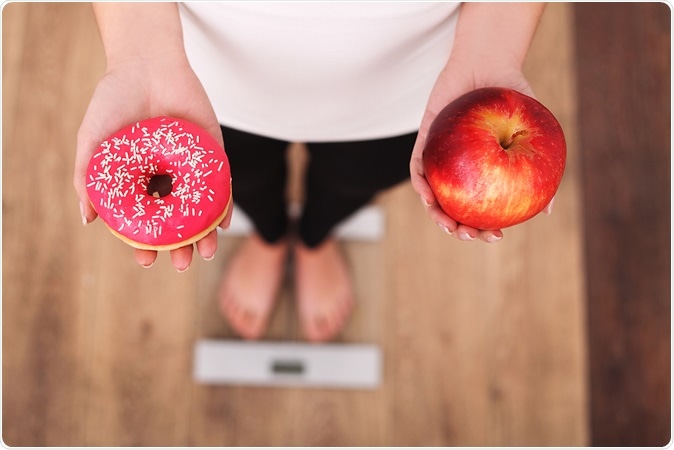Two thirds of all Australian adults are overweight or obese leading to more than one disease complications such as a diabetes and heart disease. Management of weight includes one of the two tried and tested methods – maintaining a healthy diet regimen and regular exercise. It is most commonly seen that most people give up on their diet regimens and plans within a few days or weeks of starting on them and researchers at CSIRO have looked into why people give up their diets.

Image Credit: Yuriy Maksymiv / Shutterstock
The latest CSIRO report analyzed the five most important types of diet related personality types. For their online participant study they looked at over 90,000 Australian adults. They thus obtained a clear picture of the population and their dietary adherences. This is termed as one of the largest-ever diet and personality survey in Australia. Results reveal that not surprisingly, food cravings are the commonest reasons why people give up on their diets within a few days or weeks of beginning on them.
Report’s co-author, CSIRO Behavioural Scientist Dr Sinead Golley explained that it is the personal diet type, lifestyle and daily factors as well as personality that can determine if a person would find it difficult to lose weight by just maintaining a healthy diet. These are the reasons why diets do not work for some she said.
The report looked at five distinct diet personality types and also noted what was the major diet hurdle for each of the personality types. “Cravers” form the second most common type of diet personalities. They noted that this group was most likely to be derailed from their diets as for them maintaining a healthy diet may become a real challenge be resisting delicious foods that they crave for. Dr Golley noted that they found that one in five of the Cravers had tried to lose their gained weight over 25 times in their survey. One of the greatest food craves include chocolate and confectionery.
The study found five different diet personalities including;
- 37% Thinkers – This group had 86% women and these persons tend to over-analyse their progress with a diet and have typically perfectionists view of their performance with unrealistic expectations. This results in feelings of failure with a diet and thus non-adherence to a diet.
- 26% Cravers – This group finds it hard to resist temptations and 58% of Cravers are obese as a result.
- 17% Socializers – These persons indulge in food and alcohol more commonly because of their active social life.
- 16% Foodies – These persons are most balanced and tend to have a normal weight. They are passionate about food and its preparation. They tend to eat healthy and for them alcohol is one third of their discretions.
- 4% Freewheelers – they are impulsive eaters and have poorest quality of diet. They are most likely men and they do not plan their meals. Over half of them are obese.
One of the commonest food personality type is the “Thinker” Dr. Golley said. These people are perfectionists and when they are faced with a challenge they tend to give up on their diets and thus are derailed. Across generations the food personality habits show interesting patterns she explained. Baby boomers and the older persons over 71 years he explained were “Socializers” and “Foodies”. This means that they had a significant lifestyle and social factors influencing their eating habits and patterns. With age and different lifestyle and social changes, their eating habits too varied a lot. Millennials and Gen X, Dr Golley noted, were more likely to be Cravers or Thinkers or Freewheelers. These people were younger and were more likely to use fitness trackers and apps that would help them lose weight. Older generations turned to support groups and diet books for help, the study found.
CSIRO's online Diet Type survey when taken can provide a person with insight into what is best suited for him or her in terms of diet. Dr. Golley explained that personal triggers and understanding why a person fails repeatedly at holding on to a diet can help devise more fool proof strategies for themselves.